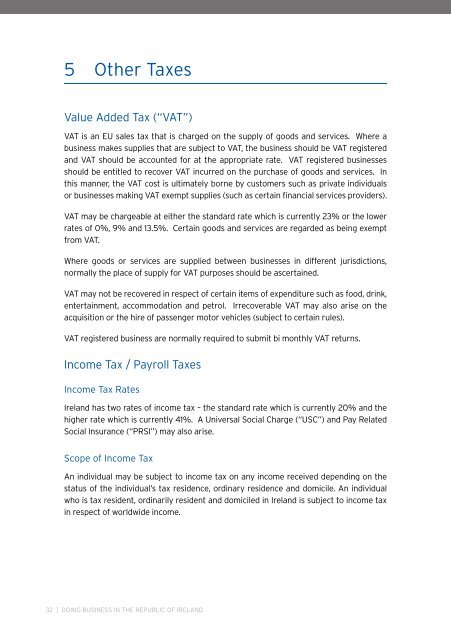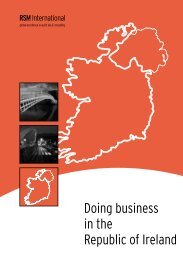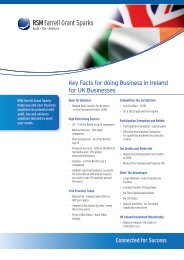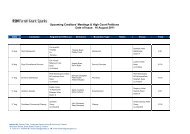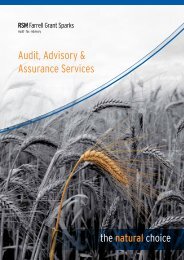DBI Ireland_July 2013 - RSM Farrell Grant Sparks
DBI Ireland_July 2013 - RSM Farrell Grant Sparks
DBI Ireland_July 2013 - RSM Farrell Grant Sparks
Create successful ePaper yourself
Turn your PDF publications into a flip-book with our unique Google optimized e-Paper software.
5 Other Taxes<br />
Value Added Tax (“VAT”)<br />
VAT is an EU sales tax that is charged on the supply of goods and services. Where a<br />
business makes supplies that are subject to VAT, the business should be VAT registered<br />
and VAT should be accounted for at the appropriate rate. VAT registered businesses<br />
should be entitled to recover VAT incurred on the purchase of goods and services. In<br />
this manner, the VAT cost is ultimately borne by customers such as private individuals<br />
or businesses making VAT exempt supplies (such as certain financial services providers).<br />
VAT may be chargeable at either the standard rate which is currently 23% or the lower<br />
rates of 0%, 9% and 13.5%. Certain goods and services are regarded as being exempt<br />
from VAT.<br />
Where goods or services are supplied between businesses in different jurisdictions,<br />
normally the place of supply for VAT purposes should be ascertained.<br />
VAT may not be recovered in respect of certain items of expenditure such as food, drink,<br />
entertainment, accommodation and petrol. Irrecoverable VAT may also arise on the<br />
acquisition or the hire of passenger motor vehicles (subject to certain rules).<br />
VAT registered business are normally required to submit bi monthly VAT returns.<br />
Income Tax / Payroll Taxes<br />
Income Tax Rates<br />
<strong>Ireland</strong> has two rates of income tax – the standard rate which is currently 20% and the<br />
higher rate which is currently 41%. A Universal Social Charge (“USC”) and Pay Related<br />
Social Insurance (“PRSI”) may also arise.<br />
Scope of Income Tax<br />
An individual may be subject to income tax on any income received depending on the<br />
status of the individual’s tax residence, ordinary residence and domicile. An individual<br />
who is tax resident, ordinarily resident and domiciled in <strong>Ireland</strong> is subject to income tax<br />
in respect of worldwide income.<br />
32 | DOING BUSINESS IN the republic of ireland


